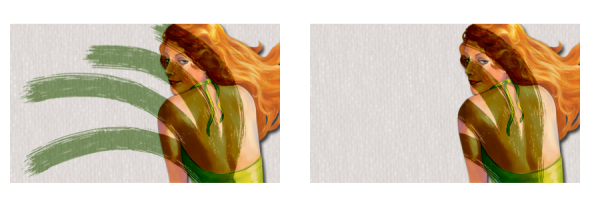
| • | To preserve layer transparency |
By default, the Preserve Transparency setting is disabled, which lets you paint anywhere on the layer. When the setting is enabled, the transparent areas are preserved, and you are confined to painting on areas of the layer that already contain images.
The results of painting on a layer with Preserve Transparency disabled (left) and enabled (right)
If you want to paint on a shape, you must first commit the shape to a pixel-based layer. For more information, see Converting shapes to image layers.
A good way to think about preserving transparency is in terms of a layer mask. As described in Creating and deleting layer masks, a layer mask defines the visible areas of a layer.
Preserving transparency also affects the results of cutting or erasing on a layer.
| • | When Preserve Transparency is disabled, erasing or deleting images restores transparency to the area and reveals the underlying image. |
| • | When Preserve Transparency is enabled, erasing or deleting images reveals the document’s paper color. In effect, erasing or deleting with Preserve Transparency enabled is the same as painting or filling with the document’s paper color. |
Erasing part of a layer (the woman’s hair) with Preserve Transparency disabled restores transparency (left). When the option is enabled, erasing reveals the paper color (right).
You can create a layer mask based on the layer’s transparency. A layer mask defines which areas of a layer are visible in the document window. For more information, see Creating and deleting layer masks.
| To preserve layer transparency |
|
| • | In the Layers panel, click the Preserve Transparency button |
You can also preserve a layer’s transparency by choosing Layers ![]() Preserve Transparency or clicking the Layer options button
Preserve Transparency or clicking the Layer options button in the Layers panel, and choosing Preserve Transparency.
You can load a layer’s transparency to a selection. In the Layers panel, right-click a layer, and choose Select Layer Content. Click the Layer options button in the Layers panel, and choose Create Layer Mask From Transparency. For more information, see Selections and transformations.